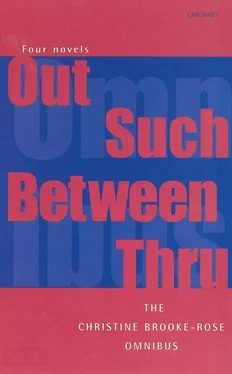U for mism
M for sis
O for the wings of a dove. I see you still have your guitar.
Yes but it’s cracked. It gives a funny sound, sort of muted.
Well, I must go. I had a jacket somewhere. What are you working on now?
Work! Oh how distant it seems. Oddly enough, The Marble Faun.
Structural analysis of?
I’m not a Structuralist I never have been. Though some of the concepts are useful. It’s more of a Transformational approach really.
Transformation of what into what?
I don’t know yet. The intuition of the native speaker into the intuition of the naive speaker perhaps.
You joking?
At the level of the signifier of course what else did you think?
Anything at all with you Larissa, language is your strength and your strength is your weakness. See you to-morrow.
There has occurred however the telescoping of the flute-player into a stereotyped foreshortened faun piping right to left on the rectangle of days with weeks and even years in an implicit depth, days that do not see themselves or the four lies reflected in the retrovizor, looking at nothing on or in the brow that Scheherezade thinks too low beneath the mat of khaki crinkly hair perhaps Etruscan or hiding behind a discourse from which the subjects vanish piecemeal, the one giving no references and the other too many thus having a mouth removed and other organs when all that is signifiable in her is struck with latency as soon as raised to the function of signifier which initiates this raising by its original disappearance, the show within the show.
For the idyll reopens out into the other idyll of Armel who is not like that at all and Veronica true icon iconoclasted before the introduction of the pistol, raising antinomies by reaction that overtakes the subjective idea, rendering it objective, here on the ocean edge, and irresistible, Aphrodite emerging from memory and beckoning, naked, sprayed with flowery foam.
For you are not qualcosa as narrated either by yourself or some other who talks like a book and wants to be read like an algebraic grammar of narrative, the punishment in final position never falling on the euphoric term, only on the dyspeptic, the moving finger piercing through the pregnant plenitude from idyll to castratrophy thus bringing about the end of the discourse. Nor have you acted out the dialogue spun by the silent narrator who is yourself perhaps making yourself articulate and wise, quick on the uptake gentle cruelonlytobekind with brief mean brushstrokes for objectivity and her semelic a wild moon detached and gazing at the earth, tide-driven and helpless so that you can save her and if that is what you want that is how it will be for you always get your way in the end by transforming the passive silence of undecidability into the undeicidable. Whoever invented it is the absent narrator or you in love with the unreliable narrator who is in love with the implied author who is in love with himself and therefore absent in the nature of things through doors opening on doors, mirrors on mirrors in an eternal game of vinciperdi with the presence and absence of signifiers that characterises the practice of language. A head in a pool on a platter in a textured cloth, the head detached to re-present the word, a disembodied voice.
Larissa?
Armel! I mean — hi.
Hi. You’re not alone I gather?
No.
Ecoute. Je suis desolé mais je ne peux pas te voir.
Pourquoi?
Je ne veux pas discuter, c’est ton affaire.
Mais tu étais d’accord.
Oui, excuse-moi. Je te dirai une chose seulement. Il est mignon comme tout et même, je crois, sincère. Mais pas mariable.
Je sais.
Oh quelqu’un l’épousera sans doute, une étudiante. Il n’est même pas sortable.
It’s all right he’s gone out on the terrace he’s very tactful, anyway I’m sure he speaks French so this farce is pointless. But Armel does it matter?
My dear, even alone with him excluding the world as lovers think they can you’ll still have to take him out, out of himself into you. Il n’est pas à ta hauteur.
Oh my hauteur I’ve told you, I’m sick and tired of my hauteur. I want to be humble, to abase myself.
Then you will. But you won’t find humility only humiliation, you’ll revolt and you’ll suffer. It’s sick. And he’s totally unconscious.
And what about you and someone else not at your hauteur?
Lara I don’t want a discussion.
That’s different isn’t it, you’re a man. Armel are you there? I’m sorry. It’s awful don’t you see what thou lovest well remains but if the lovest is removed only the narratio is left.
Are you playing anagrams again?
I can’t help it Armel it’s written in the name. Please can’t I see you before you go?
No I’m sorry, I’ve already said more than I meant. I can’t cope with this. In fact I was ill all night, vomiting.
Oh. Forgive me. You see I’m no good to you. Why did you come?
I don’t know. I did then.
Armel don’t go away.
I must.
Take me with you.
Not now Larissa. I’m sorry, I was hoping to but
Because of this? Punishing me again?
It’s a question of timing. Like letters, they never coincide. But please, look after yourself, and see a doctor before you go.
Oh I’m all right, it’s you who should see a doctor.
They’ve long given me up as you know, I heal myself.
Yes.
Well goodbye. Have a nice time.
You too. Bye, Armel. I love you.
I know. Bye.
But is it really possible to superimpose so many systems one upon the other, the social the economic the personal the traffic lights the institution of learning where the old learn from the young and the young learn nothing until one day suddenly they too are old? The exile motif on a suburban tale of Porlock upon a Gothic novel woven with the International Theme upon an eighteenth century fantasy itself the obverse of the Tristan myth known to Lancelot and Guinevere read by Paolo and Francesca then wagnerised and materlinked into Mélisande through layers and layers of books and looks that open like doors onto other doors as he comes in from the terrace high up above the traffic saying was that your husband? Yes. What did he want?
Oh just to say goodbye.
It was a hell of a long goodbye.
We have a very close relationship.
He wants you back. I know it. Of course he does you’re so wonderful that’s why we both want you. What’s the matter, you seem sad.
No. I’m just thinking. You remember how Dostoievski makes Dievushkin read Gogol’s Nose, no Gogol’s Coat, and revolt at the author’s concept of the little man, at the way he delimits him without his consent, arresting him in his own definition whereas every man knows he is not the definitions of others but for ever undefined, never coinciding with himself? Just as the trial of Dmitri Karamazov is a farce of other judgments and in the end he judges himself. And that made me think of books within books, stories within stories, each character a new tale-bearer. How far can we box in?
I don’t understand. What has all that to do with us, or with your husband. Has he upset you?
No.
You’re depressed again and you’re going to discourage me. Don’t you think I’m depressed too, after this meeting I was terrified of, and I was right, you’re different.
Stavro one can’t turn from one personality to another at the flick of a switch. One is temporarily invaded, but it will pass.
And here among all these books, it’s like a professor’s study, designed to intimidate the students.
Well it is a professor’s study Professor La Bocca’s he’s a symbolic logician oh yes you met him. Anyway I am a teacher and so are you.
But all these notes, this pile of mail and records and tapes, you seem so self-sufficient, you don’t need me at all.
Читать дальше












